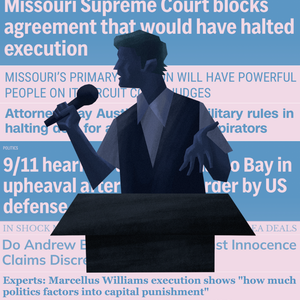
On July 29, 2023, the 8th Circuit Court of Appeals lifted a temporary stay of execution that had been issued for Johnny Johnson, a death-sentenced prisoner in Missouri. Mr. Johnson’s attorneys allege that he is insane and therefore ineligible for execution. Barring a last-minute stay from the U.S. Supreme Court, Mr. Johnson will be executed by lethal injection on August 1, 2023, for the 2002 killing of 6‑year-old Casey Williamson.
Attorneys for Mr. Johnson assert that his longstanding, severe mental illness and diagnosed schizophrenia prevent him from understanding the connection between his imminent execution and the crime he committed. In their briefs, his attorneys note that “[Mr.] Johnson has delusions about the devil using his death to bring about the end of the world.” They also argue that the state process under which he was evaluated for competency was deeply flawed. A neuropsychiatrist, board-certified in forensic psychiatry, found that Mr. Johnson does not rationally understand the reasons for his execution. The state countered with a 1.5‑page affidavit from a non-forensically trained prison counselor who had only 70 minutes of total contact with Mr. Johnson over three years. In June of 2023, the Missouri Supreme Court declined to intervene in Mr. Johnson’s scheduled execution, ruling that he had “failed to make a ‘substantial threshold of insanity.’”
The United States Supreme Court held in Ford v. Wainwright (1986) that executing the insane is “savage and in humane” and violates the Eighth Amendment’s prohibition against cruel and unusual punishment. The Court later clarified in Panetti v. Quarterman (2007) that prisoners must have a rational understanding of the reasons for their execution to be considered sane enough for execution.
Prior to Casey’s murder, Mr. Johnson had been diagnosed with schizophrenia and stopped taking his medication upon release from a mental health facility in January 2002. According to his lawyers, those close to Mr. Johnson during this time said he stopped taking his medication because it made him ‘feel like a zombie.’ At this point, he was no longer helping care for his 2‑year-old child and did not comply with the conditions of his probation for previous felony theft and burglary charges. In 2005, Mr. Johnson was formally convicted after three hours of jury deliberation, and was found guilty of first-degree murder, as well as armed criminal action, kidnapping and attempted rape. The judge presiding over Mr. Johnson’s case later sentenced him to death by lethal injection, adding that this case was “perhaps the most heinous crime” he had overseen.
Casey Williamson’s mother, Angie Wideman, told FOX 2 news in St. Louis, Missouri that “it’s her place to represent Casey.” Ms. Wideman believes that God and those who fought for Casey at trial will still continue to do so. She has “been looking forward to putting this part of it to rest,” even though she will “never put Casey to rest, but just put this part to rest.”
Missouri has executed three other individuals this year: Amber McLaughlin, Leonard Taylor, and Michael Tisius.
Heather Hollingsworth, Appellate court rules that Missouri man with schizophrenia can be executed after all, Associated Press, July 29, 2023; Dana Rieck, Johnny Johnson killed their girl. They await his Missouri execution, after deep family scars, St. Louis Post-Dispatch, July 30, 2023; Jim Salter, Missouri Supreme Court declines to halt August execution of man convicted of killing child, Associated Press, June 9, 2023; Joey Schneider, Execution of Johnny Johnson will proceed Aug. 1, stay lifted, FOX 2, July 29, 2023
Missouri
Oct 04, 2024


